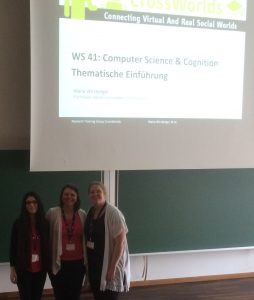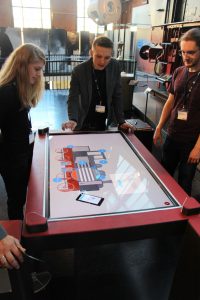From September 25th to 29th, the 47th Annual Meeting of the German Informatics Society (GI) took place in Chemnitz. With various workshops, tutorials and keynotes from outstanding experts like Lora Aroyo, Richard Stallman, Schahram Dustdar and Sören Auer, the conference comprised an important event in the national computer science community and was attended by professionals from both research and industry. In addition, it offered a rich programm for young researchers at the school, student and doctoral level.
In the afternoon of the first conference day, CrossWorlds researcher Maria Wirzberger together with fellow researcher Martina Truschzinski from the MaCeLot project introduced benefits and challenges of interdisciplinary cognitive research from perspectives of psychology and computer science. Besides of introducing relevant research from both projects, dealing with effects of delay in a virtual speech-based memory training and a computational model for predicting mental workload in an air traffic controller task, Robin Hirt from the Karlsruhe Service Research Institute introduced his work on classifying Twitter users by machine learning and CrossWorlds master student Shirin Esmaeili Bijarsari presented work from her master thesis on instructional design in a robot construction task. The speakers received valuable questions after the talks and collected interesting ideas in the final discussion session on the topic of interdisciplinarity. Thanks to our involved audience and all presenters for a great workshop!
A further main topic of CrossWorlds aims to understand how interactive devices like tabletops and tangibles work for users in real-life environments. So CrossWorlds researchers Ingmar Rothe, Benedikt Etzold and Jan-Philipp Stein grabbed the chance to present and discuss methods for conducting studies “in-the-wild” around the “Comfortable”. In order to enrich the workshop with sustained impressions, they spent the afternoon session in the Chemnitz Museum of Industry itself with “hands on” the interfaces and their own approaches. We would like to say “thank you!” to the joining researchers Andreas Bischof, Susen Döbelt and Josefine Halama, Andreas Fritsch, Andreas Mladenow and all attending guests for making the whole friday session a great experience and great fun!


Comments